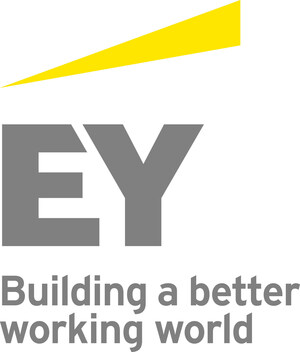- 59% of respondents say integration of risk professionals in transformation projects is essential to build trust and confidence
- 57% say the involvement of risk professionals in transformation initiatives is either limited or missing
LONDON, Sept. 20, 2018 /PRNewswire/ -- Integrating risk professionals in emerging technology and digital transformation projects improves user experience, increases digital trust and confidence in project delivery and reduces execution costs. This assessment is according to an EY poll held during a recent webcast entitled "How can you turn digital risk into a source of competitive advantage?" attended by more than 1,200 participants.
Fifty-nine percent of participants said increased digital trust and increased confidence in delivery resulted from the integration of risk professionals in digital transformation projects. However, 57% say that the involvement of risk professionals in their transformation initiatives is either limited or missing.
Amy Brachio, EY Global Advisory Risk Leader, says:
Traditionally, risk has been seen by organizations as something that needs to be mitigated, managed or ideally eliminated altogether. But risk management is not just about diminishing the downsides of doing business, it is also about maximizing the upside ways that support the organization to achieve its goals. The risk function cannot afford to operate in a silo. Not only does it need to actively engage with functions, including internal audit, IT and legal, but also with front line business leaders and external parties. An area of prime importance for businesses in an era of disruption and easily available information is maintaining Trust and credibility, which can affect reputational risk of the business. Today's' risk professionals must develop new ways to find a balance between managing risk and moving fast enough to enable enterprises to intercept opportunities and reap the rewards."
Industry convergence and new business models are emerging with the rapid technology advancements, according to the poll. All poll respondents had ongoing projects involving new or emerging technologies in the areas of digital (fifty-three percent), cloud (fifty-four percent), automation (forty percent) and advanced analytics (thirty-seven percent). However, respondents said the participation of risk professionals within these projects were either: none (twelve percent); limited or partially integrated (forty percent); while fully integrated was only (twelve percent).
Disruptions needed in the risk organization to deliver strategic value
According to the poll, a fundamental shift in mindset will be needed by organizations to evolve from the current way that they are managing risk and compliance, to a digitally enabled function that delivers strategic value.
The majority of respondents (65%) agreed on the need for disruption in the risk and governance function to drive strategic value. Thirty-one percent voted for integration of all risk functions into one approach (such as internal audit, enterprise risk, legal, compliance, health and safety). Twenty-one percent said that implementing new and emerging risk technologies such as robotic process automation, artificial intelligence and advanced analytics would be key to disrupt the risk function. A data-driven approach to risk monitoring would drive disruption, according to 21.5% of respondents, while another 17.5% said specialized resources and training was required to support a more technical and data-driven risk program.
Brachio says, "In this age of disruption, risk professionals need to disrupt themselves. Since organizations will only be able to pursue radical growth and value creation if they embrace risk and uncertainty, they need risk to evolve from being primarily a defensive function into a driver of strategic development. Risk professionals need to take advantage of new data, new technologies, new skill sets, new structures and new ecosystems to provide robust, respected and trustworthy analysis. Risk tools, such as risk intelligence, risk models, simulation functionality, and visualization platforms, can all help boards to foresee the consequences of their decisions, facilitating better decision making, quicker innovation and greater speed to market."
To learn more about EY capabilities in Digital trust, visit betterworkingworld.ey.com
Notes to editors
About EY
EY is a global leader in assurance, tax, transaction and advisory services. The insights and quality services we deliver help build trust and confidence in the capital markets and in economies the world over. We develop outstanding leaders who team to deliver on our promises to all of our stakeholders. In so doing, we play a critical role in building a better working world for our people, for our clients and for our communities.
EY refers to the global organization, and may refer to one or more, of the member firms of Ernst & Young Global Limited, each of which is a separate legal entity. Ernst & Young Global Limited, a UK company limited by guarantee, does not provide services to clients. For more information about our organization, please visit ey.com.
This news release has been issued by EYGM Limited, a member of the global EY organization that also does not provide any services to clients.
Barbara Burgess |
Aparna Sankaran |
EY Global Media Relations |
EY Global Media Relations |
+1 212 773 1652 |
+44 748 024 5082 |
barbara.burgess@ey.com |
Logo - https://mma.prnewswire.com/media/708904/EY_Logo.jpg



Share this article